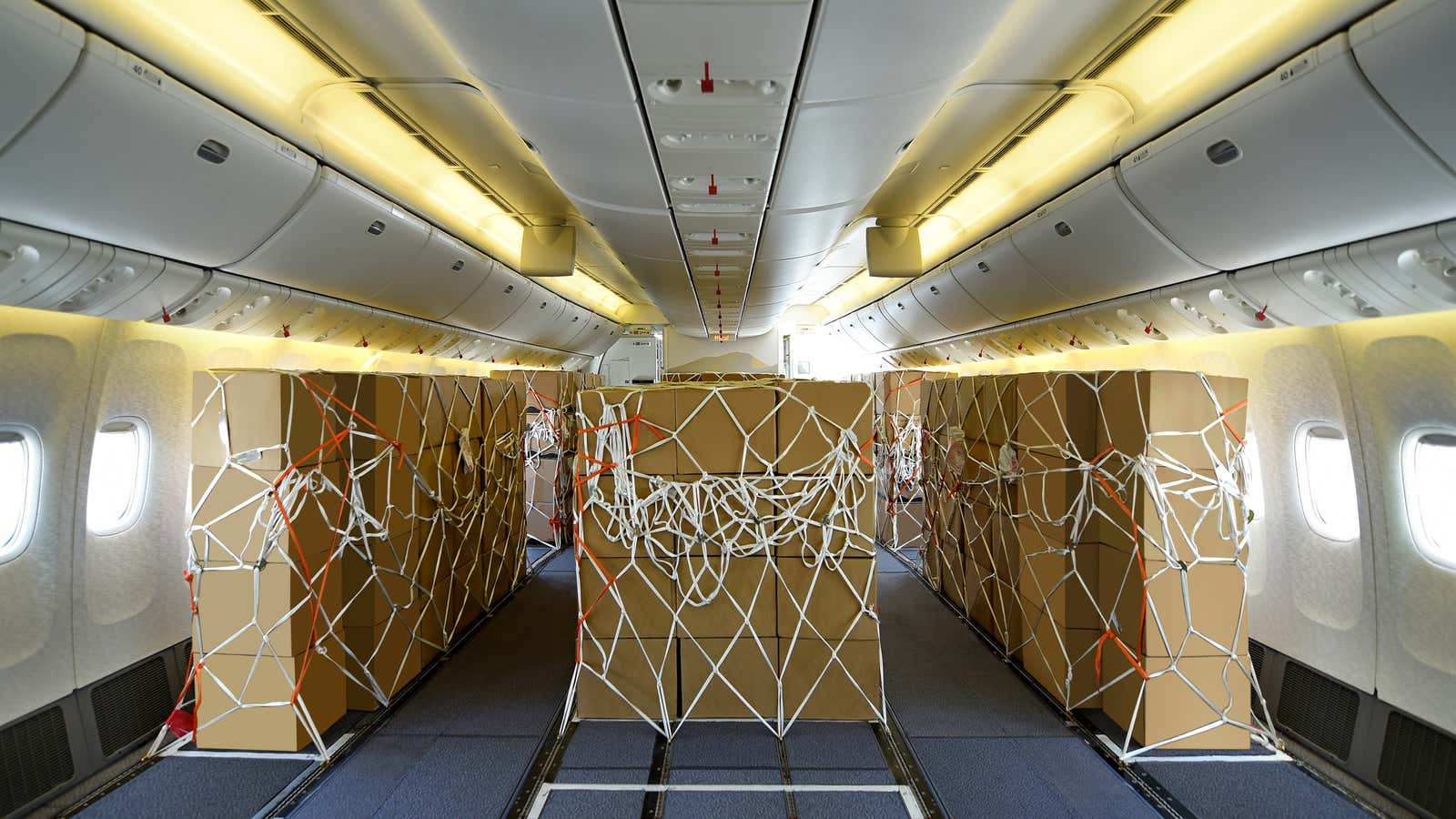During the pandemic, many airlines shifted their focus to flying freight to make up for lost passenger revenue. But no airline has adopted cargo flights with as much enthusiasm—or financial success—as United.
United’s eager embrace of freight is at once a pandemic success story, an indicator of the chaos roiling global supply chains, and a harbinger of a future in which more of our goods travel by air. United is betting the airline industry will hold onto cargo revenue even after the pandemic subsides. If its prediction comes true, it could mean billions of dollars in extra revenue for airlines—and millions of additional tons of carbon dioxide emitted into the atmosphere.
Freight flies the friendly skies
After the coronavirus pandemic reached the US in March of 2020, demand for air travel evaporated virtually overnight. It took nearly a year for passenger volumes to return to half their former heights, according to data from the US Transportation Security Administration. Although air travel nearly rebounded to pre-pandemic levels in July, buoyed by the rollout of coronavirus vaccines, it has since dipped as the extra contagious Delta variant has spread.
To plug the revenue gap, airlines leaned on cargo deliveries. They began temporarily converting their wide-bodied passenger jets into cargo planes in March 2020, and found ravenous demand for their air freight services as port closures, container shortages, and one very large ship wedged in the Suez Canal created record-setting backlogs in shipping. Within a year, air freight bounced back to pre-pandemic levels, according to data from the US Bureau of Transportation Statistics. Desperate to get their goods on time, retailers are paying extra to have them delivered by air rather than wait for long ocean transits.
United Airlines wins the freight race
The biggest winner in the airline industry’s pivot to cargo was United. The carrier, which operates one of the largest fleets of widebody planes on Earth, already had the biggest freight business among US passenger airlines. In the first 15 months of the pandemic, United flew more than 13,400 cargo-only flights to quickly bring its freight volumes back to normal levels, even as passenger totals plummeted.
Even though United isn’t carrying much more cargo than it did before the pandemic, it has managed to wring much more money out of every ton it transports. The airline’s cargo revenues have doubled over pre-pandemic levels, and now total more than $2 billion per year.
United executives are now fighting to hold onto their cargo windfall. “We are working to figure out how we keep as much of that revenue onboard United Airlines as we possibly can as we come out of the pandemic,” chief commercial officer Andrew Nocella said at a Sept. 9 transportation conference hosted by Cowen analysts, according to a transcript from Factset.
🎧 For more intel on air travel, listen to the Quartz Obsession podcast episode on flying business class. Or subscribe via: Apple Podcasts | Spotify | Google | Stitcher.
This summer, Nocella appeared chagrined consumer demand for air travel was recovering because it forced United to divert planes from profitable cargo routes to carry passengers instead. “We are not going to be able to do more cargo-only flights,” he said on a July 21 earnings call. “We’re obviously disappointed by that given where yields currently stand.” United’s passenger flights are still running half-empty as a pandemic-wary public shies away from travel, while cargo space remains at a premium.
That calculus has now shifted United’s strategy. At the Cowen conference in September, Nocella said the company was reversing its earlier decision to cancel cargo-only flights in favor of passenger routes and expected United to keep raking in big cargo revenues into the future. “I just released five 777-300s to our cargo division for later this year to put those aircraft back into all-cargo markets based on the dynamics we’re seeing in the marketplace today,” Nocella said.
